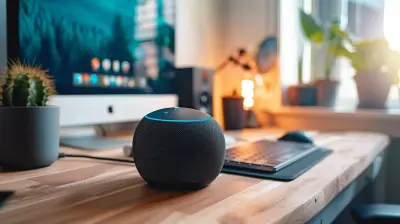The Growing Importance of Data Privacy in the Healthcare Sector
12 June 2025
Data privacy has always been important, but in today's digital world, it has become an absolute necessity—especially in healthcare. With medical records shifting from paper files to electronic databases, protecting sensitive patient information has never been more critical.
Think about it—would you be comfortable knowing your medical history could be accessed by hackers or sold to third-party companies without your consent? Probably not. That’s why healthcare organizations must prioritize data privacy like never before.
In this article, we'll dive deep into why data privacy is becoming a hot topic in the healthcare sector, the risks involved, and what measures can be taken to keep patient information safe from prying eyes.
Why Data Privacy in Healthcare Matters More Than Ever
Healthcare organizations deal with some of the most personal and sensitive data out there—patients' medical histories, prescriptions, test results, and even genetic information. If this data falls into the wrong hands, the consequences can be severe.Here’s why data privacy in healthcare is more critical than ever:
1. The Rapid Digital Transformation
Healthcare has gone digital. From electronic health records (EHRs) to telemedicine, patient data is now stored and transferred electronically. While this makes healthcare more efficient, it also opens the door to cybersecurity threats.2. The Rise of Cyber Attacks
Hackers love healthcare data—it's valuable on the black market. Unlike credit card numbers that can be changed, medical records contain permanent information like Social Security numbers and medical conditions. This makes healthcare data a prime target for cybercriminals.3. Stronger Data Regulations
Governments are cracking down on data privacy. Laws like HIPAA (Health Insurance Portability and Accountability Act) in the U.S. and GDPR (General Data Protection Regulation) in Europe impose strict guidelines on how healthcare organizations handle patient data. If they don’t comply, they face hefty fines.
The Risks of Poor Data Privacy in Healthcare
So, what happens when healthcare organizations fail to protect patient data? The consequences can be disastrous. Here are some of the biggest risks:1. Data Breaches
A data breach can expose thousands—sometimes millions—of patient records. This can lead to identity theft, fraud, and even manipulation of medical records.2. Loss of Patient Trust
If a hospital or clinic experiences a data breach, patients may lose confidence in the healthcare system. Would you trust a doctor with your sensitive health data if their database was hacked last week? Probably not.3. Legal and Financial Consequences
Hospitals and healthcare providers that violate data privacy laws can face massive fines. Lawsuits from patients may follow, costing millions in legal fees and settlements.4. Medical Identity Theft
Imagine someone using your medical information to obtain prescriptions or medical treatment. Not only could this cost you money, but it could also lead to dangerous errors in your medical history—potentially putting your health at risk.
How Healthcare Organizations Can Strengthen Data Privacy
Now that we know the risks, let’s talk about solutions. How can healthcare providers ensure that patient data is kept safe?1. Implement Strong Cybersecurity Measures
Just like banks protect financial data, healthcare organizations must invest in top-notch cybersecurity. This includes firewalls, encryption, multi-factor authentication, and regular security audits.2. Train Healthcare Staff on Data Privacy
Believe it or not, human error is one of the biggest reasons data breaches happen. Something as simple as a weak password or clicking on a phishing email can put patient data at risk. Regular training sessions can help employees recognize threats and follow best practices.3. Use Encryption for Sensitive Data
Encryption ensures that even if hackers get their hands on patient data, they won’t be able to read it. It’s like putting medical records in a safe with an unbreakable lock.4. Restrict Data Access
Not everyone in a hospital needs access to every patient’s medical record. By limiting access based on job roles, healthcare organizations can reduce the risk of data leaks.5. Conduct Regular Security Audits
Cyber threats evolve, and so should security measures. Regular security audits help healthcare organizations identify vulnerabilities before hackers do.6. Ensure Compliance with Data Privacy Regulations
Staying up-to-date with laws like HIPAA, GDPR, and the CCPA (California Consumer Privacy Act) ensures that healthcare organizations follow best practices and avoid hefty fines.
The Role of Patients in Data Privacy
Healthcare organizations are responsible for protecting patient data, but what about patients themselves? There are a few things individuals can do to take control of their data privacy:1. Be Mindful of What You Share Online
Think twice before sharing sensitive medical information on social media or unverified websites. Hackers can use this data against you.2. Ask Healthcare Providers About Their Privacy Policies
Don’t hesitate to ask your doctor or hospital how they protect your personal health information. Understanding their security measures can give you peace of mind.3. Use Strong Passwords for Health Portals
Many healthcare providers offer online portals for medical records and appointments. Use a strong, unique password to keep hackers out.4. Monitor Your Medical Records
Check your medical records periodically to ensure there are no errors or signs of fraud. If you notice something strange—like a procedure you never had—report it immediately.The Future of Data Privacy in Healthcare
With advancements in artificial intelligence, cloud computing, and IoT (Internet of Things) devices, healthcare technology is evolving faster than ever. But as technology grows, so do privacy concerns.Emerging Technologies and Their Impact on Data Privacy
- AI in Healthcare: AI-driven diagnosis and treatment planning require massive amounts of patient data. Ensuring AI systems follow privacy regulations will be crucial.- Wearable Health Devices: Devices like smartwatches and fitness trackers collect real-time health data. How this data is used and who has access to it raises privacy concerns.
- Cloud-Based Health Records: Cloud storage makes accessing medical records easier, but weak security measures can leave data vulnerable to breaches.
Striking the Balance Between Innovation and Privacy
The challenge moving forward is finding the right balance—leveraging technology to improve healthcare while keeping data privacy intact. Healthcare institutions, lawmakers, and tech developers must work together to create solutions that protect patient data without stifling innovation.Final Thoughts
Data privacy in the healthcare sector isn’t just a passing trend—it’s a necessity. As healthcare continues to adopt digital advancements, the importance of keeping patient information safe cannot be overstated.From cybersecurity threats to legal implications, data privacy affects everyone—from hospitals and doctors to you, the patient. It’s up to healthcare organizations to implement strict data privacy measures, but patients also need to stay alert and proactive about their personal information.
With the right safeguards in place, we can ensure that healthcare technology benefits us without compromising our privacy. After all, shouldn’t our most sensitive health information remain exactly that—private?
all images in this post were generated using AI tools
Category:
Data PrivacyAuthor:

Adeline Taylor
Discussion
rate this article
3 comments
Abram Price
Data privacy in healthcare: because nobody wants their medical history as gossip material!
June 23, 2025 at 11:28 AM

Adeline Taylor
Absolutely! Protecting medical data is crucial to maintaining patient trust and confidentiality.
Cassandra Banks
Data privacy in healthcare is no longer just a regulatory requirement; it’s a critical component of patient trust. As digital records proliferate, ensuring robust data protection measures is vital. Healthcare providers must prioritize safeguarding sensitive information to build confidence and encourage patients to engage with digital health solutions.
June 16, 2025 at 12:48 PM

Adeline Taylor
Thank you for highlighting the essential link between data privacy and patient trust. As we embrace digital health solutions, prioritizing robust data protection is indeed crucial for fostering confidence and encouraging patient engagement.
June McEachern
As patient whispers intertwine with digital threads, let privacy guard our health's sacred secrets.
June 13, 2025 at 2:37 AM

Adeline Taylor
Thank you for highlighting the delicate balance between patient confidentiality and digital innovation in healthcare. Protecting privacy is indeed vital for safeguarding our health information.



